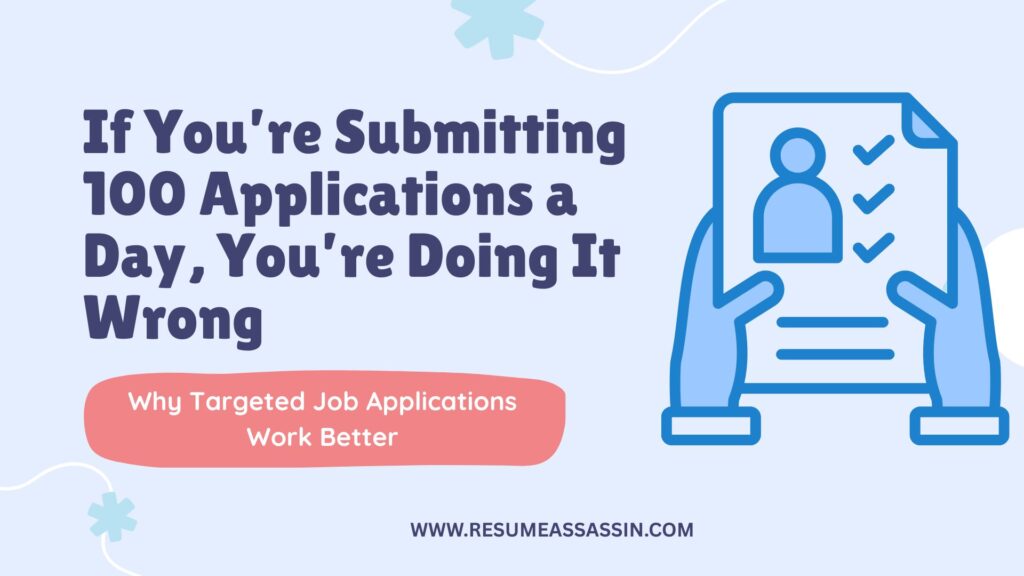
We’ve all heard the stories. Or maybe you’re living it right now.
You’re waking up, grabbing coffee, logging into job boards, and applying to every single role you see that matches even half your skill set. Maybe you’re applying to 30, 50, or even 100 jobs in a single day.
And when nothing comes of it — no interviews, no calls, not even an automated rejection email — you assume it’s the job market, the economy, or a broken system.
And yes, those factors do play a role.
But here’s a truth that most people don’t want to hear:
Volume-based job hunting is not just ineffective — it’s exhausting, demoralizing, and outdated.
You’re not alone in thinking that the more you apply, the higher your chances. But the truth is, more applications don’t equal more opportunities.
In fact, they often lower your odds.
Why the “Spray and Pray” Approach Doesn’t Work Anymore
Let’s break it down:
Most companies now use Applicant Tracking Systems (ATS), which screen resumes before a human ever sees them. If your resume doesn’t include keywords and phrases from the job description, it likely won’t make it past the bot.
Worse? Recruiters can smell a copy-paste application from a mile away.
If you’re applying for multiple jobs at the same company — especially roles that are clearly unrelated — you’re setting off red flags. It sends the message that you’re not serious about this role; you’re just trying to get in somewhere, anywhere.
Here’s what else happens when you go wide instead of deep:
- You lose the energy and clarity to tailor your message.
- You skip the research that makes your application feel personal.
- You overwhelm your own tracking system (if you even have one).
- And most damaging? You start equating effort with effectiveness — but they’re not the same.
You begin to think, “I’m doing so much and still getting nothing.”
But in reality, you’re doing a lot — just not in the way the current hiring system rewards.
The Truth: The Job Search Is Not a Numbers Game — It’s a Positioning Game
You’re not a robot and shouldn’t job search like one.
What works today is intentionality. Precision. Strategy.
Not submitting 100 rushed applications — but maybe 10 targeted ones that actually show who you are, what you bring, and why you’re a fit.
Here’s What Targeted Job Searching Looks Like:
You might be applying to fewer jobs, but each one is done with care and research. That means:
- Tailoring your resume and cover letter to each job. Yes, it takes more time — but it shows effort and increases your chance of making it through the ATS and impressing a recruiter.
- Using the company’s language. Mirror their job description, mission, or tone in your application. Show alignment early.
- Highlighting your fit clearly. Don’t just list duties. Show how your results solve their specific problems.
- Researching the company culture. Read employee reviews, check their website, and follow their leadership on LinkedIn to get a sense of voice and values.
- Reaching out to someone inside the company. A polite message asking for insight or offering your enthusiasm can build a connection that boosts your visibility in the hiring process.
This method takes longer. But the ROI is higher.
It’s not about doing everything. It’s about doing what works.
The Emotional Cost of Mass Applying
Here’s something that’s rarely discussed:
Mass applying drains your confidence.
You start with hope. You hit “Apply” 50 times.
And after days or weeks of silence? You feel defeated.
That kind of rejection — especially the kind that comes with zero feedback — builds over time. It convinces smart, capable people that they’re not valuable. It erodes your confidence and makes you question your career choices, your worth, your identity.
And that’s not okay.
The truth is, if you’re not hearing back, it’s not necessarily you.
But it may be your method.
Mindset Shift: Fewer Applications, Better Strategy
It’s time to move from a “more is better” mentality to a “right fit” strategy.
This means:
- Slowing down to craft better applications.
- Tracking where you apply and what version of your resume you used.
- Following up respectfully when appropriate.
- And most importantly, respecting your own energy in the process.
You’re not a factory. You’re a professional with value.
Don’t let a broken system trick you into acting like a bot.
Final Thoughts
In a world where automation is king and competition is fierce, human connection still wins.
The job search shouldn’t be about spamming — it should be about standing out.
When you go from applying to 100 jobs a week to maybe 10 well-chosen, well-crafted applications — something magical happens. You feel more in control. You understand your value better. And you start to see more responses.
You don’t need to do more.
You need to do what matters — better.
